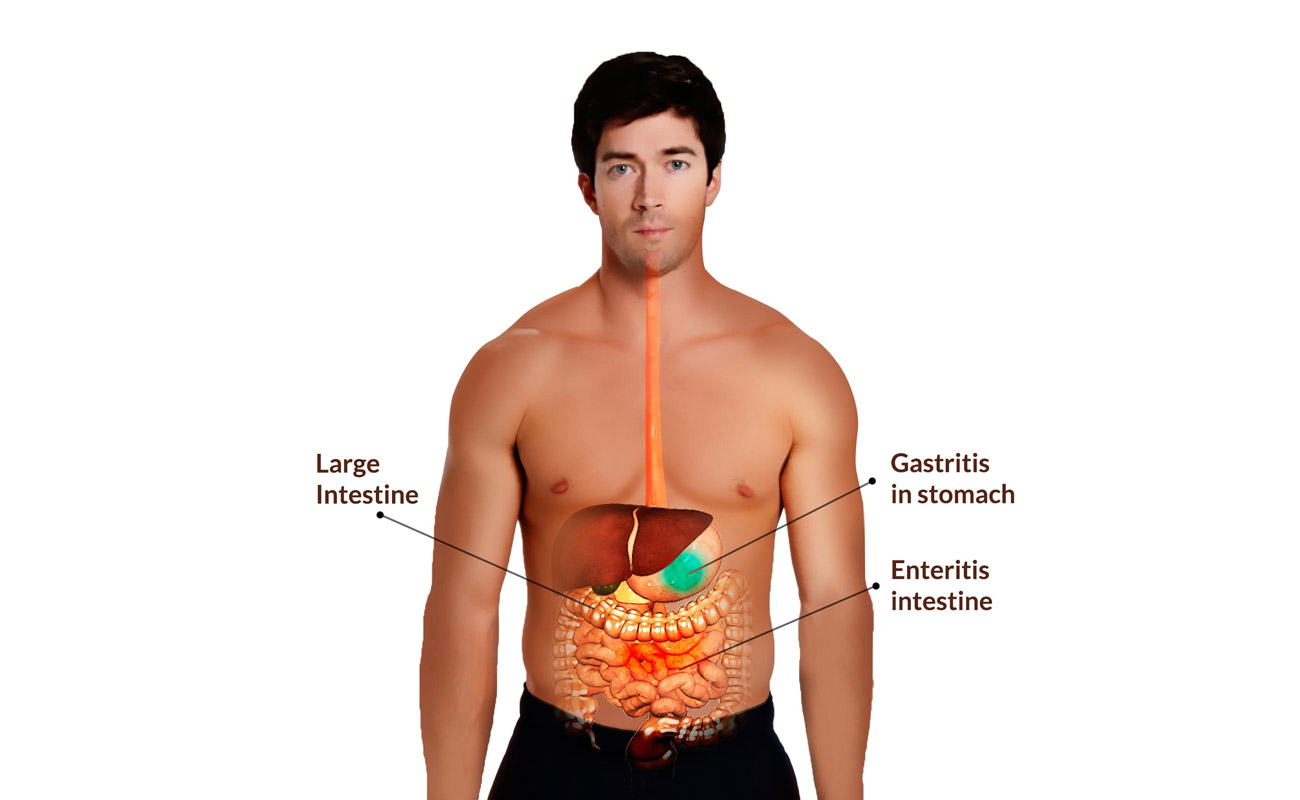What
Gastroenteritis is a very common condition that causes diarrhea and vomiting. It's usually caused by a bacterial or viral tummy bug.

It affects people of all ages, but is particularly common in young children.
Most cases in children are caused by a virus called rotavirus. Cases in adults are usually caused by norovirus (the "winter vomiting bug") or bacterial food poisoning.
Gastroenteritis can be very unpleasant, but it usually clears up by itself within a week. You can normally look after yourself or your child at home until you're feeling better
Symptoms

Although it's commonly called stomach flu, gastroenteritis isn't the same as influenza. Real flu (influenza) affects only your respiratory system — your nose, throat and lungs. Gastroenteritis, on the other hand, attacks your intestines, causing signs and symptoms, such as:
- Watery, usually nonbloody diarrhea — bloody diarrhea usually means you have a different, more severe infection
- Abdominal cramps and pain
- Nausea, vomiting or both
- Occasional muscle aches or headache
- Low-grade fever
Depending on the cause, viral gastroenteritis symptoms may appear within one to three days after you're infected and can range from mild to severe. Symptoms usually last just a day or two, but occasionally they may persist as long as 10 days.
Because the symptoms are similar, it's easy to confuse viral diarrhea with diarrhea caused by bacteria, such as Clostridium difficile, salmonella and E. coli, or parasites, such as giardia.
Stomach Flu and Children

Children can get dehydrated quickly, so if your child has the stomach flu, it's important that you look for signs that he is very thirsty or has dry skin or a dry mouth. If you have a baby, look for fewer, drier diapers.
Keep children with gastroenteritis out of day care or school until all symptoms are gone. Check with your doctor before giving your child any medicine. Drugs used to control diarrhea and vomiting aren't usually given to children younger than 5.
To help prevent rotavirus -- the most common cause of stomach flu for children -- there are two vaccines that can be given to infants. Talk to your doctor about the vaccines.
Causes of bacterial gastroenteritis
Numerous bacteria can cause gastroenteritis, including:
- yersinia, found in pork
- staphylococcus, found in dairy products, meat, and eggs
- shigella, found in water (often swimming pools)
- salmonella, found in meat, dairy products, and eggs
- campylobacter, found in meat and poultry
- E. coli, found in ground beef and salads
Bacterial gastroenteritis outbreaks can happen when restaurants serve contaminated food to many people. An outbreak can also trigger recalls of produce and other foods.
Bacterial gastroenteritis can be easily transmitted from person to person if someone carries the bacteria on their hands. Every time a person infected with this bacteria touches food, objects, or other people, they risk spreading the infection to others. You can even cause the infection to get into your own body if you touch your eyes, mouth, or other open parts of your body with infected hands.
You’re especially at risk for these infections if you travel a lot or live in a crowded area. Washing your hands often and using hand sanitizer with more than 60 percent alcohol can help you avoid catching infections from the people around you.
Risk factors
Including
- Drinking well water
- Eating undercooked food, especially seafood
- Improperly stored food
- Travel to high risk areas
- Any condition that causes a weakening of the immune system such as:
- Diabetes
- Organ transplant
- Chemotherapy: The administration of medicines that kill cancer cells.
- AIDS
- Living around poor sanitation* Living in close quarters:
- Army barracks
- Dormitories
- Nursing homes
Prevention
The pathogens that cause gastroenteritis are very infectious and can survive outside the host for up to weeks. Extensive handwashing and avoiding contact with sick individuals are critical steps in preventing infection. Contaminated surfaces must be cleaned promptly with a dilute bleach or other disinfecting solution. Proper handling of food; adequate refrigeration; and thorough cooking of eggs, meats, and fish help prevent the growth and spread of harmful bacteria. Extra caution is necessary when traveling to countries where parasites like Giardia are common. Drinking water from untreated lakes and rivers is not advisable without first using an effective water purifier.
Diagnosis and treatment

Gastroenteritis is typically diagnosed based on symptoms alone. A stool sample may be used to identify the causative pathogen. Most patients with gastroenteritis treat their symptoms at home and fully recover within days to weeks. Hospitalization becomes necessary when complications such as dehydration, excessive weight loss, and high fever arise.
- Hydration. Fluid loss due to repeated episodes of vomiting and/or diarrhea can lead to dehydration, which is common in infants, young children, and the elderly. Regular hydration with simple broths and non-caffeinated liquids is required to replenish the body’s electrolytes. Oral rehydration solutions (e.g. Pedialyte®) are also available without a prescription. If sufficient hydration is not achievable at home, then a doctor administers fluids intravenously.
- At-home remedies. During bouts of vomiting and diarrhea, frequent intake of small amounts of liquid and simple foods (e.g. rice, potatoes and bread) is recommended. Avoiding foods high in fat and sugar, dairy, caffeine, and alcohol helps to relieve the symptoms of gastroenteritis. Over the counter drugs that slow or stop diarrhea are also available.
- Prescription medications. Antimicrobial drugs to treat bacterial and parasitic gastroenteritis are prescribed when symptoms become severe, or when complications develop.
Reference
- “Viral Gastroenteritis ". National Digestive Diseases Information Clearinghouse (NDDIC). NIH. Apr 2012. Retrieved Apr 9, 2014. http://digestive.niddk.nih.gov/ddiseases/pubs/viralgastroenteritis/#treated.
- “Viral Gastroenteritis: Heartburn and more". National Center for Immunization and Respiratory Diseases. CDC. Feb 2011. Retrieved Apr 9, 2014. http://www.cdc.gov/ncidod/dvrd/revb/gastro/faq.htm.
- "Bacterial gastroenteritis". MedlinePlus. NIH. Jan 2011. Retrieved Apr 9, 2014. http://www.nlm.nih.gov/medlineplus/ency/article/000254.htm.
- “Giardia infection”. MedlinePlus. NIH. May 2012. Retrieved Apr 9, 2014. http://www.nlm.nih.gov/medlineplus/giardiainfections.html.
- “Giardia infection”. Centers for Disease Control and Prevention. Jul 2013. Retrieved Apr 9, 2014. http://www.cdc.gov/parasites/giardia/epi.html.
- Teunis PFM, Moe CL, Liu P, et al. Norwalk virus: how infectious is it?. J Med Virol. 2009. 80:1468-76.
- "Drinking Water/Camping, Hiking, Travel". Centers for Disease Control and Prevention. Jan 2012. Retrieved Apr 10, 2014. http://www.cdc.gov/healthywater/drinking/travel/.
- freemd.com/gastroenteritis/risk-factors.htm
- Bacterial gastroenteritis. (2016). http://www.ncbi.nlm.nih.gov/pubmedhealth/PMH0001300/
- Bacterial gastroenteritis (2016). http://www.fairview.org/healthlibrary/Article/89211
- Campylobacteriosis. (2015, July 10). http://wwwnc.cdc.gov/travel/yellowbook/2016/infectious-diseases-related-to-travel/campylobacteriosis
- Diseases and conditions: Gastroenteritis (2016). http://my.clevelandclinic.org/health/diseases_conditions/hic_Gastroenteritis
- Gastrointestinal infections and diarrhea (2015, September).
http://kidshealth.org/en/teens/diarrhea.html# - Humphries, R. M. & Linscott, A. J. (2015, January). Laboratory diagnosis of bacterial gastroenteritis. Clinical Microbiology, 28(1), 3-31. http://cmr.asm.org/content/28/1/3.full
- Food poisoning. (2014, July 24). http://www.mayoclinic.org/diseases-conditions/food-poisoning/basics/definition/con-20031705
- Food safety. (n.d.). http://www.health.vic.gov.au/foodsafety/downloads/poison_prevent.pdf
- Staphylococcal food poisoning. (2010, March 1). http://www.cdc.gov/foodsafety/diseases/staphylococcal.html
- mayoclinic.org/diseases-conditions/viral-gastroenteritis/basics/symptoms/con-20019350
- webmd.com/digestive-disorders/gastroenteritis#1
- nhs.uk/conditions/Gastroenteritis/Pages/Introduction.aspx




Submit Comment